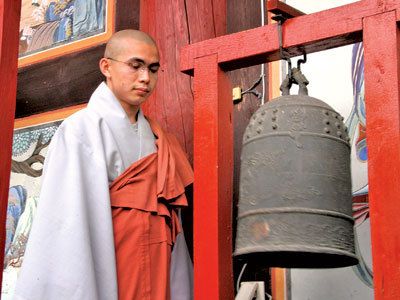
It’s 3:45 a.m., and I’ve been awakened by the loud banging of a wooden percussion instrument. I slip into my itchy grey training suit and make my way blindly up a set of stone steps. At the top, a monk is ceremoniously striking a drum while sleepy tourists silently file into temple.
Here at the Lotus Lantern International Meditation Centre, a two-hour drive from Seoul, South Korea, visitors can spend a night experiencing the life of a monk. This 12-year-old temple complex was designed for foreigners looking to study Buddhism.
Tourists sleep on a traditional Korean cot, wake up at the crack of dawn, eat simple food, wash their own dishes, meditate and learn the philosophical principles of Zen Buddhism.
Though an overnight stay is short, the goal is to inspire visitors to learn more. My introduction to monkhood begins in the golden temple with some early morning chanting. Breathing deeply, I take in my surroundings: the smell of incense, a gleaming gold statue of Buddha, the deep hum of meditative monks.
Reciting the “Bopsheen Jeeriohn,” the monks prepare for their prostrations — 108 prostrations, to be exact. Hands pressed together, bending down to the kneeling position, I try to follow their lead.
I place my forehead to the floor and my palms on the ground. Part squat, part push up, part penitence, the prostrations are strenuous and hard on the knees. After 20, I start to question whether I can do all 108.
“The greater pain your body feels the heavier negative karma you have,” reads a nearby sign. By this logic, I’m ridden with bad karma.
Blood pumping and knees cracking, I continue to struggle with the prostrations while the monks perform their early morning ritual calmly and with ease. Clearly, I need some practice at this spiritual practice. From the temple, our group of wannabe monks move to the meditation room.
Sitting crossed-legged on a cushion, I sit up straight and try to clear my mind. “Meditation is a tool which helps us be present in the moment, rather than living in the past or the future,” says Alexander, a Russian monk who’s been studying here for the past five years. Counting my breaths in and out, I feel relaxed, my mind concentrated.
But my focus doesn’t last long. A pesky mosquito buzzes around me like a kamikaze pilot, coming in for a crash landing.
Since Buddhists don’t believe you should kill living creatures (blood-sucking mosquitoes included) I have no choice but to gently swat it away and try to regain my meditative focus.
Normally, my mind is continually making to-do lists, so medititation doesn’t come easily. It’s hard for me to imagine how monks such as Alexander are able to spend most of their days dedicated to the pursuit.
After the experience, I realize that while I’m drawn to the philosophical principles of Buddhism (living in the present moment, renouncing desire for money and material objects) when I come face to face with worldly pleasures, I crack.
For example, the monks believe that food is meant to sustain the body for enlightenment rather than for enjoyment.
But I’m not nearly disciplined enough to think of nirvana when faced with temporary indulgences like banana splits, bacon cheeseburgers or eggs Benedict.
Extra hollandaise sauce, please. For more articles, videos and travel tips from Julia Dimon visit juliadimon.com
< back to the episode
< back to the list of articles |

